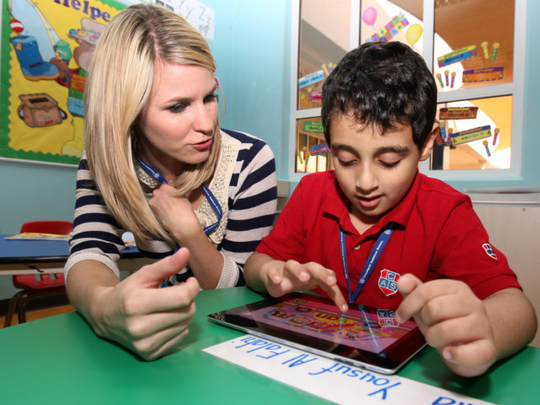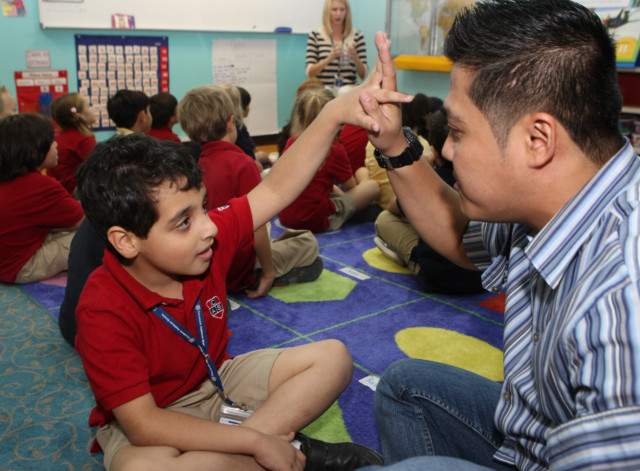
Dubai: When one speaks of inclusive education, the role of Learning Support Assistants (LSAs) comes to the fore. Without their help, students with special needs may not be in mainstream schools.
Observably, without LSA Jerome Diquiatco, six-year-old Emirati Rashid Yousuf Al Falahi wouldn’t be in KG2 at the Collegiate American School in Dubai. The student is diagnosed with autism, a developmental disorder.
Diquiatco’s title is at times referred to as shadow teacher or teaching assistant. Titles notwithstanding, LSAs are the foot soldiers in the fight towards inclusive education.
The primary remit of Diquiatco’s job is to provide support on one-on-one basis. He helps students with mild to moderate special needs overcome learning barriers in the classroom and school-wide activities.
With his assistance, Rashid follows school routines and understands classroom expectations. Diquiatco helps the six year old in his academic skills and social behaviour, managing unfamiliar and/or challenging environments. He aids Rashid’s teacher Amy Sauders in the class of 22 students.
Most importantly, he encourages Rashid to be independent, said Diquiatco speaking to Gulf News.
In class, Diquiatco nudges Rashid if his attention wanders. He also prompts in identifying objects. “If Rashid is asked to identify a dog, I might say, ‘Duh’, a partial verbal prompt, for him to say, ‘Dog’.”
Diquiatco frequently calls Rashid ‘Buddy’.
Rashid’s mother Dalya told Gulf News, “Without Jerome, my son wouldn’t have been at a regular school.”
The Emirati family was refused admission to the school where Rashid’s elder sister Mariam, nine, is enrolled. “We are happy that he has adjusted so well and learnt so much at the school. We were worried whether he would ever get a normal education,” said the mother.
UN convention
There are several parents like Dalya who are desperate for a qualified LSA to help their children.
Since the UAE ratified in 2008 the United Nations Convention on the Rights of Persons with Disabilities, academic institutions in the country are enrolling students with special needs. The Convention assures an inclusive education system at all levels.
In this, the Knowledge and Human Development Authority (KHDA) and the Dubai School Inspection Bureau (DSIB) have pushed for greater inclusion.
However, the 2012 annual report by DSIB stated that the provision for students with special educational needs is weak in many schools. The report said that most schools often lack appropriate specialist support and that shadow teachers need to ensure that children receive the support they need.
Official figures on the number of students with special needs at mainstream schools aren’t available. Educators estimate that about 10-15 per cent of students in emirate’s 148 schools can be categorised as students with special educational needs (SEN).
The vast spectrum of needs makes an LSA’s job unique.
Diquiatco understands the demands only too well. When he started out in 2001 as an ABA (Applied Behaviour Analysis) therapist, armed with a BSc in Psychology, he began to work with dozens of students.
The learning barriers can vary, said Diquiatco who has helped students with special needs in the Philippines and in Dubai where he works at the Child Early Intervention Medical Centre.
The condition can vary from blindness or partial sight or hearing; speech impediments like a lisp; Autistic Spectrum Disorder (ASD); Attention Deficit Hyperactivity Disorder (ADHD), and Specific Learning Difficulty (SpLD) in reading, writing or spelling, among others, he said.
Patience and compassion
“I have helped students with Autism and ADHD,” he said.
Still, qualification isn’t the only requirement of the job.
Diquiatco gives equal importance to patience and compassion. “My job requires a balance of professionalism and compassion. One needs to know how to manage behaviours depending on the condition and the personality of the child. ”
As a LSA, Diquiatco is part of a growing group in the emirate.
He said, “There is a high demand for qualified LSAs given the large numbers of parents seeking to enrol their children with special needs in mainstream schools.
Diquiatco said: “It can get challenging when students show aggressive behaviour, throw tantrums and refuse to socialise. But on most days, it is a rewarding experience watching them progress.”
In Rashid’s case he said he was taken by surprise during his reading assessment this year. “He read on his own without any prompts. It made me proud.”
The sense of pride was palpable when he spoke about his old students. “Many of them who I helped in primary class are now in high school. I am in touch with them and their parents,” he said.
Rashid’s teacher Saunders told Gulf News that she values Diquiatco’s role, and has seen remarkable progress in Rashid’s performance since the beginning of the academic year.
She said, “Jerome is doing a wonderful job. Rashid used to get upset due to the new routine adjustment at beginning of the school year. Now he readily mingles with the kids and answers questions in maths, social studies, science, and reading. Apart from Rashid’s development, children in the class have been sensitised to understand and accept others’ differences.”
On the same subject, Abigail D’Souza, the Learning Support Teacher at the school said that shadow teachers or LSAs are vital in the classroom to ensure successful inclusion. She told Gulf News, “The ultimate goal is to fade the presence of the shadow, encourage independence and shift the responsibility for academic performance onto the student.”
Diquiatco too recognises this goal. He said he hopes that Rashid like several of his former students will one day cease to need him.













